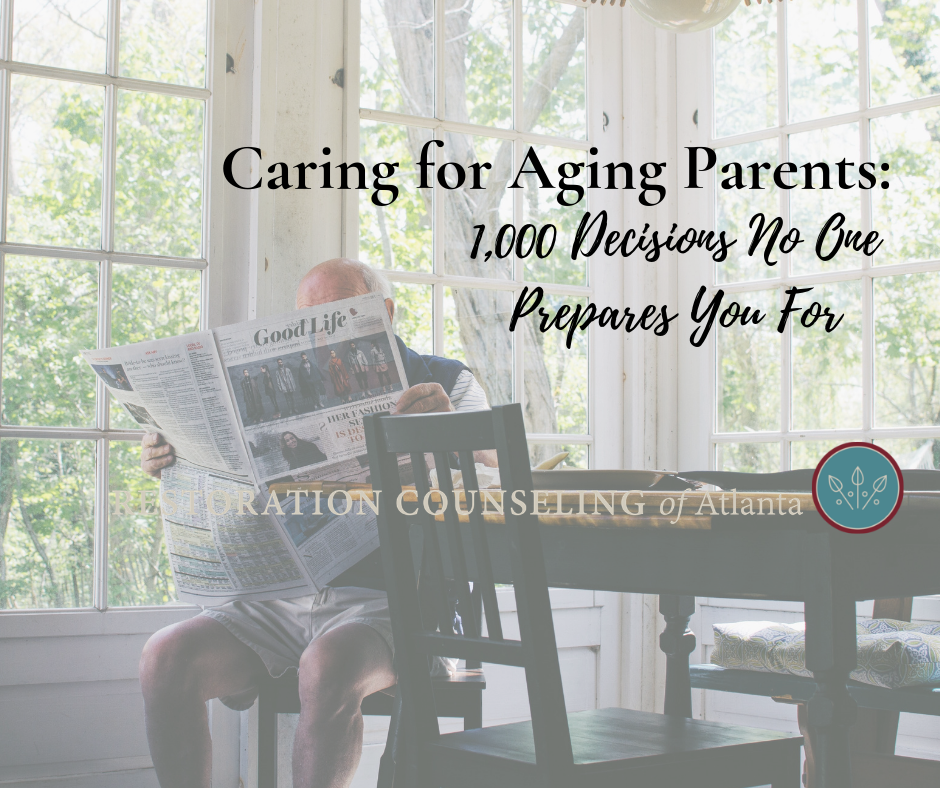My father was very active in his retirement, even running several small businesses. So while he had battled non-Hodgkins lymphoma for nearly a decade, when he suddenly declined, it was still a shock and disorienting to us all. Through the experience of caring for him and later my mother, I came to appreciate the preparations we made and also learned some wise practices that can minimize the confusion and trauma associated with the aging of your parents.
You may be involved with your parent’s care already, or you may just be thinking about the future and what it could bring; either way, there are things you can do today and going forward to help when sudden, and not so sudden, crises come in the future. I want to offer you these suggestions for loving your parents well in challenging seasons.
Be Proactive
Investigate
It is shocking to discover your parent is having a health crisis or to visit and find things aren’t as they were the last time you were there, but refusing to accept the situation or pretend that it doesn’t exist is far worse. Your first investigative step is to assess how your parent is doing. You need to look deeply enough to see if they still have what they need to take care of each other or to continue living alone.
The second investigative step is to educate yourself on your parent’s preexisting health challenges. This will allow you to make wise decisions if your parent’s condition suddenly worsens. Also, there will frequently be occasions when you need to communicate your parent’s medical history to a medical professional. Knowing your parent’s medical history will aid the doctors and nurses in making accurate diagnoses and giving effective care.
The last step is reflective. Does your parent need your help now? Alternatively, can he maintain his independence longer? What will maintain his dignity and self-respect while also providing for his comfort and care?
Discuss
Talk to your parent in advance, assuring her of your intention to honor her desires and wishes. Ask her to share with you how she imagines her later years. Does she see herself in her current home? What does she think about long term care facilities? Is her current home adaptable for aging in place and handicap accessibility?
Essential topics to talk with her about include the following:
- Can she afford long term health insurance? Do you know how to use it if they need it?
- What are her financial preparations for the future?
- Does she have enough current friendships?
- Does she have the emotional support she needs as she watches many peers and friends pass or decline in these final years?
Have these conversations now about reducing uncertainty and distress in the future.
Prepare
As you consider caring for your parent in the future, you must look ahead with your spouse about your ability to meet their specific needs. What kind of sacrifices will you be able to make as an individual and a family when you’re in those hard times? We must evaluate if our parent has the appropriate medical and legal documents in place now and if not, then make plans to get these completed. If your parent becomes incapacitated, then it will be too late to have these documents signed and will cause difficulty managing assets and gaining permission for health care decisions. Be sure you learn where they keep critical information and consider getting added to your parent’s accounts to make emergency money management a more natural process.
Learn
Be a student of others in this same life struggle. Not everyone’s timeline is the same, but many others have been where you are. It is wise to pay attention to critical steps your friends take to ease themselves through this life stage. Cultivate healthy relationships with your siblings and talk in advance about how you might share future work responsibilities and needs. Build relationships with your parent’s friends. You may need someone to check on your parent or give you honest feedback about how he is doing around issues of independence and functionality.
The Caregiver Challenges
Successful Caregiving
Caregiving is an essential role in all families. Our declining or sick parent usually can’t make it on her own. She will need help. Your challenge as her child is to recognize how you might help her. Remember to pace yourself as you work to be a present and future helper.
Here are a few ideas for successful caregiving:
- Spread out the workload amongst a few family members.
- Even while caregiving, maintain your values in the caregiving process.
- Be patient with yourselves and others as everyone does not deal with shocking or bad news in the same ways.
- Recognize that some of your family will deal with denial making it harder for them to get involved with helping.
- Your healthier parent will need your support since this difficulty puts the most significant stress and burden on her.
When you make time to add these elements to your caregiving process, you have smoother transitions and will be more successful in working together as a family.
Finding Support In Your Family
In an ideal environment, you want to support your family from within your family entirely. It’s lovely when your siblings come together and work with one another to care for your parents. Your spouse needs to be your best ally. You want him to understand the seriousness of the situation, support you while you deal with the stressful periods, and comfort you when and if grieving moments come. He will be a crucial resource for you as you make changes in your regular life responsibilities.
Adjusting As Things Change
The constancy of change is one certainty as you care for your aging parent. You often adapt to one element of how things are, who’s doing which jobs, how often you are traveling to see your parents, and then another stage of decline occurs. You must strive to take one day at a time recognizing that when the next phase comes, you will do your best to adjust again.
Signs of Burnout
It is very common for caregivers to struggle with burnout as they go the long distance needed in caring for a seriously ill parent. Please note that some of the critical symptoms of burnout include:
- Fatigue
- Irritability
- Sleeplessness
- Feelings of helplessness
- Cynicism about their job
- A tendency towards self-disparagement.
Finding respite care for you or your family can protect them from the symptoms of burnout. Consider having your siblings rotate coming to town to help take weekend shifts caring for your parent. These small adjustments can make a huge difference in how your family holds up under the pressure of constant caregiving. It’s important to note that without communication the caregiver’s feelings of fear, helplessness, and anger often get worse. When this happens, it’s helpful if you recognize and addresses their burnout.
Overwhelming the Situation with Love
You can survive these hard times, but it will be difficult. As you do your best to care for your parent, he will feel your love and care. If there are challenges in your parental relationship, as there are for many people, this will tax those pre-existing difficulties. At times the best thing you can do is recognize that the process of dependence and decline that your parent is going through creates a chance for new relational interactions. In God’s grace, there might even be repair. I was surprised at how many of these moments I found in the final months of my parent’s lives. Don’t forget to ask God for those types of closing interactions recognizing that He is the God of reconciliations and restorations.
It’s a critical time of life to offer love and care. You must attend to your parent’s needs, pay attention to what you can do, and do not be afraid to ask for help. I hope that this article helps highlight some proactive steps you can take now, normalizes some of the struggles, recognize the stages of burnout, and encourages you that you can make it through this hard stage of life. As you improve your ability to work with your family, you strengthen your ability to care for your aging parents.
 Written by: Jennifer Stuckert, Clinical Director, LPC
Written by: Jennifer Stuckert, Clinical Director, LPC
Roswell Location
jennifer@restorationcounselingatl.com, ext. 111
Jennifer is passionate about using distinctly Christian counseling to help struggling individuals, couples, and families. With almost two decades of counseling experience, she has spent since 2009 serving as the director and supervisor of the staff of Restoration Counseling of Atlanta. She works with adolescents, families, couples, and individuals helping them gain relief from life challenges through biblically sound methods and a specific emphasis on adaption according to personality and learning styles. She is certified in EMDR and completed extensive course work in Sexual Addiction Counseling.

